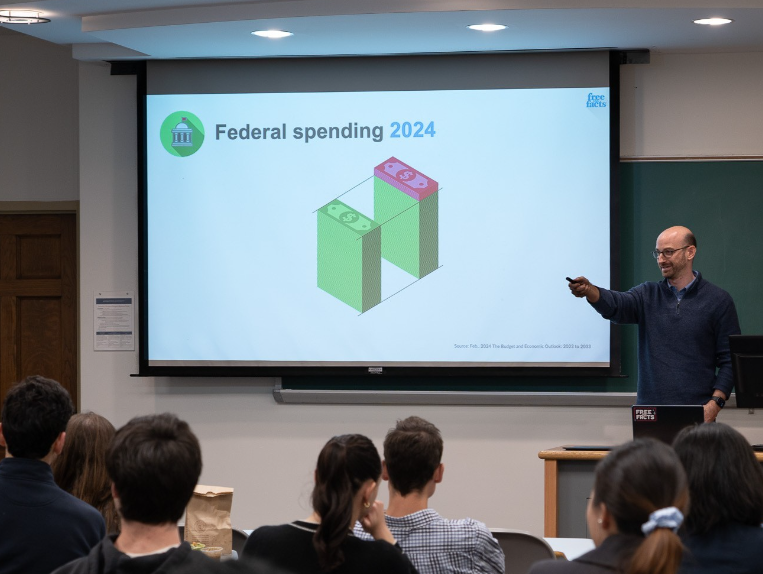A nonpartisan non-profit organization busted myths and answered questions about Medicare, a federal health insurance program for disabled people and those aged 65 or older March 18. The event was hosted by the Georgetown Bipartisan Coalition, a student group that strives to facilitate dialogues across the aisle.
Free the Facts, which aims to provide young Americans with unbiased information about federal policies such as Medicare, came to Georgetown University as part of their Spring Campus Policy Tour, through which the organization aims to promote fair discourse about public policy at colleges around the country. At the event, Tom Church, a senior policy advisor at Free the Facts, explained the history of Medicare and argued that young people should be invested in reforming Medicare policies.
Church said the idea that Medicare should only matter to people approaching the eligibility age of 65 is a common misconception about the program.
“I swear by the end of this, I think you will think this will affect your life before you turn 65,” Church said at the event.
Indeed, 14% of all Americans enrolled in Medicare are under age 65. Furthermore, in 2021, funding for Medicare arose from general tax revenues (46%), payroll tax revenues (34%), and premiums paid by beneficiaries (15%).
Church said Medicare has a huge influence over the American health care system, as it determines the amount of money that enrolled people have to pay for medical devices, procedures and treatments that are not covered fully or at all by Medicare.
“Medicare dictates medical prices for America like you wouldn’t believe,” Church said. “The Centers for Medicare and Medicaid Services has 10,000 individual payment codes for every Medicare device, procedure, etcetera.”
According to Free the Facts, approximately 65 million people benefit from Medicare, but the health insurance program faces serious fiscal challenges as the federal government grapples with its high cost, which is funded primarily through taxpayer money. In 2032, the government is expected to spend $1.7 trillion on Medicare, with $1 trillion coming from general tax revenue.
Church also pointed to rising medical costs and lack of access to hospitals and practitioners as challenges to the Medicare system.
According to Church, another challenge is that the American Association of Retired Persons (AARP) has historically held an influential lobbying presence regarding issues affecting older Americans, such as Medicare.
“Everytime that anyone has tried to change Medicare benefits on the recipient side, you have had to get the AARP on your side,” Church said. “It’s a hard thing to change.”
Victoria Yanes, program operations coordinator at Free the Facts, said the organization values both parties’ opinions in evaluating policies like Medicare.
“We have people from both the left and the right and they are the ones who create the curriculum that is translated into our policy presentations,” Yanes told The Hoya. “People from both sides have to agree down to the last number, the last dollar sign, and this is all agreed unanimously.”
Church encouraged students at the event to reach out to their government representatives and take political action of their own to achieve a more affordable, sustainable Medicare program.
“Call your legislative aide and say, ‘This is going to cost me a lot of money,’” Church said. “‘What are we going to do about this?’”
Victoria Allen (CAS ’27), a student ambassador at Free the Facts, said she believes Medicare is a vital policy in ensuring that all Americans have equitable access to medical care and treatment.
“You kind of get out of the D.C. bubble and there’s these problems that are affecting really rural areas; we don’t want them to be losing access at all, but we need to continue funding this program so that we can help all Americans at the end of the day,” Allen told The Hoya.
Regardless of which specific policy solutions individual students support, Church hopes that they are open to changing Medicare for the better.
“Please be amenable to fixing it,” Church said.









